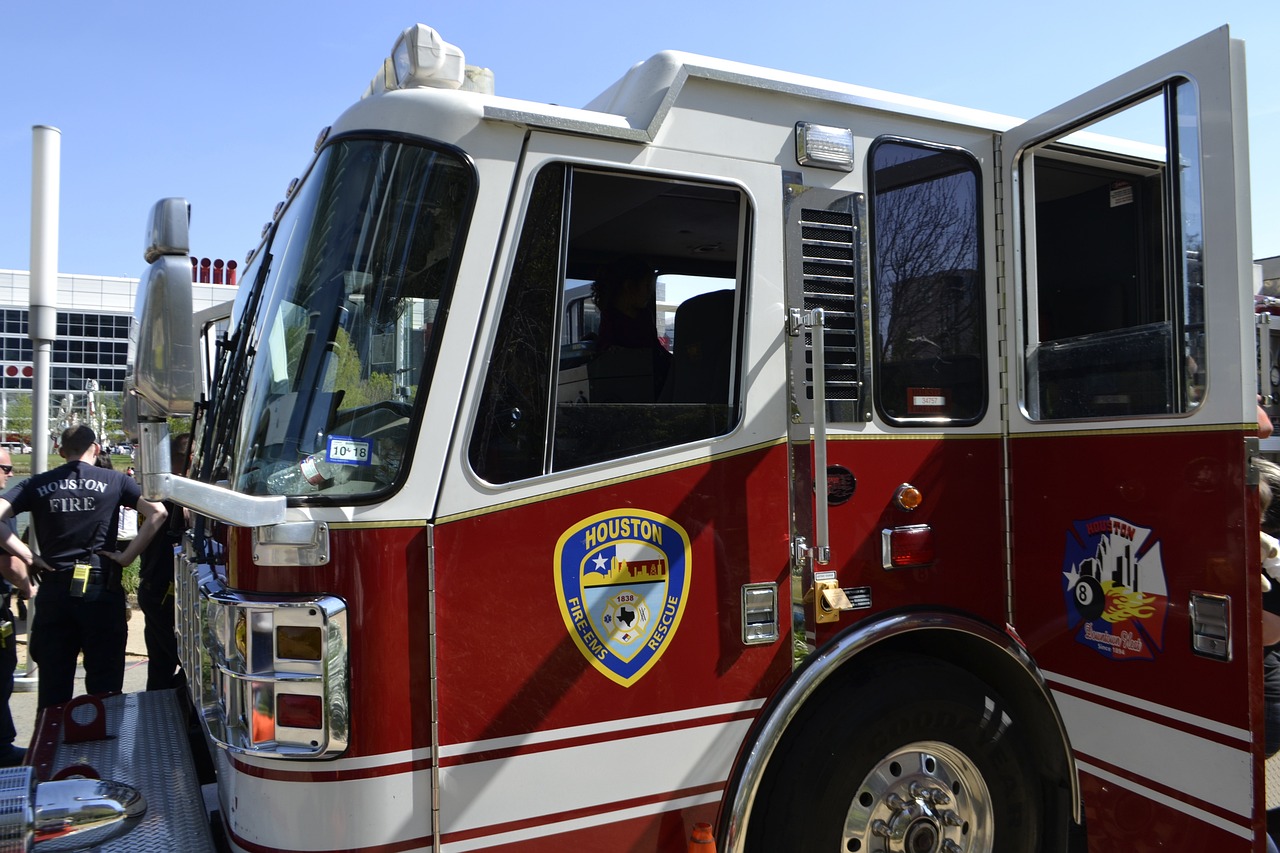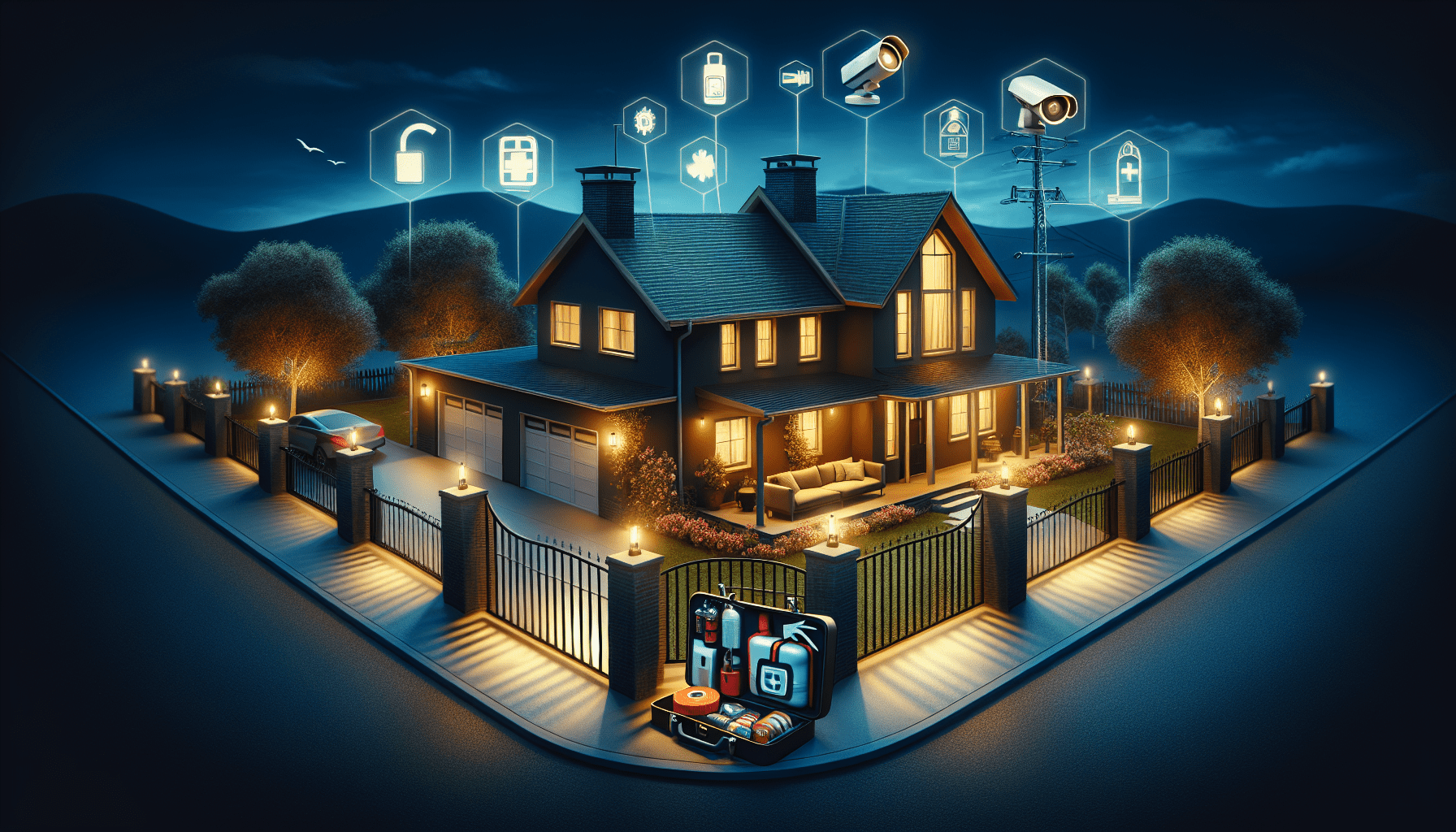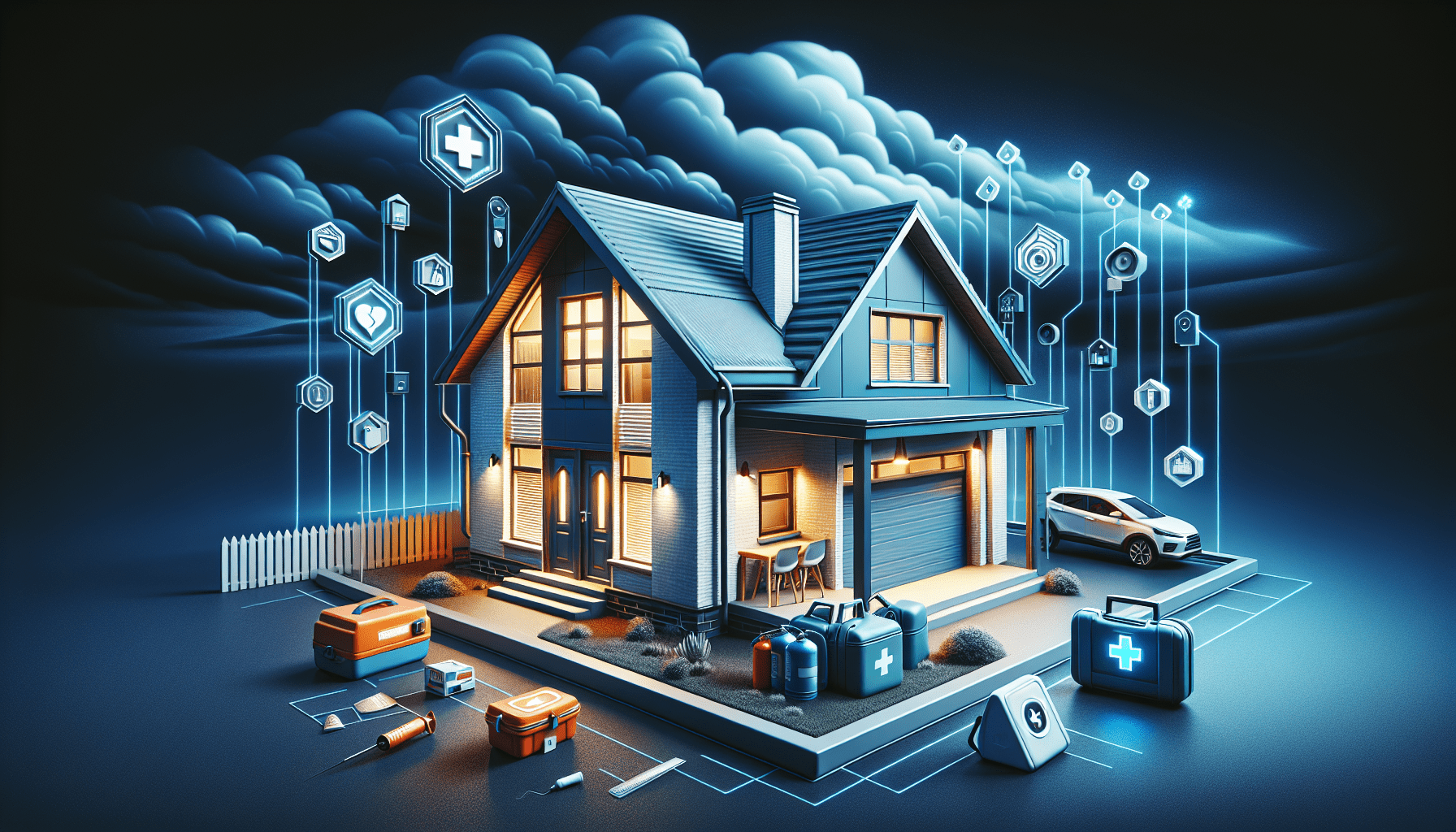Imagine this scenario: you’re sitting at home, enjoying a peaceful evening, when suddenly a disaster strikes. Whether it’s a fire, a break-in, or a natural disaster, the safety of your home and loved ones is instantly at risk. But fear not, for there are simple yet effective ways to safeguard your home in times of emergency. From installing sturdy security measures to having a well-thought-out emergency plan, this article will guide you through the best ways to protect your home when the unexpected happens. It’s time to arm yourself with knowledge and peace of mind.

Install Security Systems
Alarm Systems
Installing alarm systems in your home is one of the best ways to protect yourself and your property. These systems have sensors that detect unauthorized entry and immediately sound an alarm. This can help deter burglars and alert you to any potential dangers.
Security Cameras
Another effective security measure is the installation of security cameras around your home. These cameras act as a deterrent for potential criminals, and they also provide valuable evidence in the event of a break-in or other emergency situation. With advancements in technology, you can now even monitor your cameras remotely using your smartphone or computer.
Motion Sensor Lights
Motion sensor lights are an excellent addition to your home security system. These lights are triggered by motion and automatically illuminate your property, making it difficult for anyone to approach undetected. Having well-lit areas also reduces the chance of accidents and makes it easier to identify potential threats.
Secure Entry Points
Solid Doors
Securing your home starts with having solid doors as your entry points. Look for doors made of solid materials like metal or solid wood. These doors are more resistant to forced entry and provide an extra layer of protection. Additionally, consider reinforcing your doors with door jammers or bars for added security.
Deadbolt Locks
Deadbolt locks are an essential part of securing your home’s entry points. Make sure you install high-quality deadbolt locks on all your exterior doors. These locks are much stronger than standard doorknob locks and are harder to pick or break. Remember to keep your deadbolt locks locked at all times, even when you’re at home.
Reinforced Windows
Your windows are another vulnerable point of entry that should not be overlooked. Consider reinforcing the glass with shatter-resistant film or installing window security bars. You can also add window sensors or glass-break sensors which will set off an alarm if someone attempts to break in.

Create a Strong Perimeter
Fencing
A strong, well-built fence can create an effective barrier between your home and potential intruders. Choose a fence that is difficult to climb, such as a tall wooden or metal fence. Ensure that the fence is properly maintained and does not have any holes or weak spots that could compromise its security.
Security Gates
If your property has a driveway or an entrance that can be accessed by vehicles, installing a security gate can be an excellent security measure. These gates can be opened remotely or with a code, allowing you to control who enters your premises. Some security gates also come with additional features such as intercom systems or video cameras for further convenience and safety.
Shrubbery and Landscaping
Strategic placement of shrubbery and landscaping can provide additional security to your home. Planting thorny bushes around ground-level windows and beneath fences can act as a deterrent, as it makes it difficult for intruders to access your property without getting caught or injured. Just be sure to trim back any overgrown plants that could provide hiding spots for potential criminals.
Establish Communication
Emergency Contact List
Creating an emergency contact list is an essential part of being prepared for any situation. Make a list of important phone numbers, including police, fire department, poison control, and your insurance company. Make sure to keep this list in a visible location, such as on your refrigerator or near your phone, and share it with all the members of your household.
Neighborhood Watch Groups
Getting involved in your local neighborhood watch group is an excellent way to enhance the security of your home. These groups work together with law enforcement to keep an eye out for suspicious activity and share information among neighbors. By joining a neighborhood watch group, you can benefit from a network of neighbors who are all invested in the safety of your community.
Intercom Systems
Installing an intercom system in your home can provide an added layer of security and convenience. With an intercom system, you can communicate with visitors without having to open the door. This allows you to verify their identity before granting access to your home. Some intercom systems also have video capabilities, allowing you to see who is at your door without actually going outside.

Keep Emergency Supplies
First Aid Kit
Having a well-stocked first aid kit is crucial in case of any injuries or medical emergencies. Make sure your kit includes essentials such as bandages, antiseptic ointment, pain relievers, and emergency contact information. Store the first aid kit in an easily accessible location and be familiar with its contents and how to use them.
Emergency Food and Water
In the event of a natural disaster or other emergency situation, it’s important to have a supply of non-perishable food and water. Aim to have at least three days’ worth of food and water stored. Choose items that have a long shelf life and are easy to prepare, such as canned goods, granola bars, and bottled water. Don’t forget to regularly check and rotate these supplies to ensure they remain fresh.
Flashlights and Batteries
Power outages are common during emergencies, so it’s essential to have a reliable source of light. Keep several flashlights in easily accessible areas of your home, along with a supply of extra batteries. LED flashlights are a great option as they often have a longer battery life and are more energy-efficient.
Practice Safety Measures
Fire Safety
Fires can cause extensive damage to your home and pose a significant risk to your safety. Establish fire safety measures, such as installing smoke detectors on every level of your home and regularly testing them. Have a fire extinguisher on hand and ensure everyone in your household knows how to use it. Create a fire escape plan with designated meeting points and practice it regularly.
Flood Safety
If you live in an area prone to flooding, it’s important to take proactive steps to protect your home. Keep valuables and important documents in waterproof containers. Consider installing flood sensors or water alarms in your basement or lower levels, which can quickly alert you to rising water levels. Ensure your gutters and downspouts are clear of debris to prevent water from pooling around your home’s foundation.
Earthquake Preparedness
Living in earthquake-prone areas requires additional safety measures. Secure heavy furniture and appliances to the walls to prevent them from toppling during an earthquake. Create an emergency kit with necessary supplies such as food, water, and a battery-powered radio. Familiarize yourself with drop, cover, and hold-on techniques to protect yourself during an earthquake.

Create an Emergency Plan
Evacuation Routes
Knowing the best evacuation routes in your area is crucial in case of an emergency. Map out primary and alternate routes from your home to safe locations, such as designated shelters or the homes of friends or family members. Make sure everyone in your household is familiar with these routes and practice evacuating to ensure a swift and safe exit.
Meeting Points
Establishing meeting points is essential in case you and your family members become separated during an emergency. Choose a safe location outside of your home and neighborhood where everyone can gather. Make sure everyone knows the address of the meeting point and how to get there from various locations such as work, school, or other frequently visited places.
Emergency Contacts
Compile a list of emergency contacts, including family members, friends, neighbors, and local authorities. Make sure each member of your household carries a copy of this list in their wallet or backpack. Additionally, save these contacts in your phone and label them as ICE (In Case of Emergency) for easy access.
Stay Informed
Local News and Alerts
Stay informed about what’s happening in your local area by regularly checking local news and emergency alerts. Sign up for text or email notifications from your city or county emergency management agency to receive up-to-date information on any emergencies or severe weather conditions.
Weather Updates
Knowing the weather forecast can help you prepare for potential emergencies. Stay tuned to local weather stations or use weather apps on your smartphone to receive accurate and timely updates. Be aware of any upcoming storms, heatwaves, or other weather events that could impact your safety.
Emergency Notifications
Make sure your phone is set to receive emergency notifications such as Amber Alerts or severe weather warnings. These notifications can provide critical information and instructions in emergency situations. Keep your phone charged and within reach at all times, especially during severe weather or when there is a heightened risk of emergencies.

Maintain Home Insurance
Review Policy Coverage
Regularly review your home insurance policy to ensure you have adequate coverage for your property and belongings. Familiarize yourself with the details of your policy, including deductibles, limits, and exclusions. If necessary, consult with your insurance provider to make any necessary updates or adjustments to your coverage.
Update Valuables Inventory
Create a comprehensive inventory of your valuable belongings, including receipts, photographs, and serial numbers if applicable. Store this inventory in a safe place, such as a fireproof safe or an encrypted digital file. Regularly update this inventory to reflect any new purchases or changes in value.
Contact Insurance Provider
In the event of an emergency or disaster, promptly contact your insurance provider to initiate the claims process. Familiarize yourself with the necessary steps to report a claim and ensure you have the contact information readily available. Keep in mind that having proper documentation, such as photographs and receipts, will greatly expedite the claims process.
Join Neighborhood Watch
Regular Neighborhood Meetings
Attending regular neighborhood watch meetings provides an opportunity to connect with your neighbors and stay updated on local safety concerns. These meetings often include presentations by local law enforcement, which can provide valuable insights and tips on protecting your home and community. By actively participating in these meetings, you become an engaged and proactive member of your neighborhood.
Security Patrols
Consider organizing or participating in neighborhood security patrols. These patrols involve residents taking turns walking or driving around the neighborhood to deter crime and report suspicious activity. During these patrols, you can keep an eye out for anything out of the ordinary and remain vigilant in safeguarding your community.
Community Engagement
Engaging with your community is an effective way to promote safety and protect your home. Attend community events, participate in volunteer activities, and get to know your neighbors. Creating a close-knit community fosters a sense of shared responsibility and encourages everyone to look out for each other.
In conclusion, protecting your home in an emergency requires a proactive approach and a comprehensive plan. By installing security systems, securing entry points, creating a strong perimeter, establishing communication channels, keeping emergency supplies, practicing safety measures, creating an emergency plan, staying informed, maintaining home insurance, and joining a neighborhood watch, you can significantly enhance the safety of your home and the well-being of your family. Remember, it’s always better to be prepared than to be caught off guard in an emergency.
